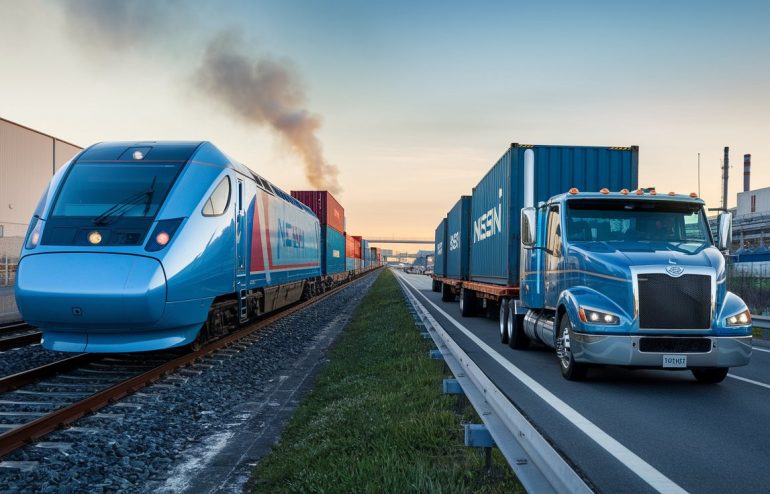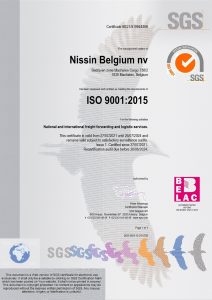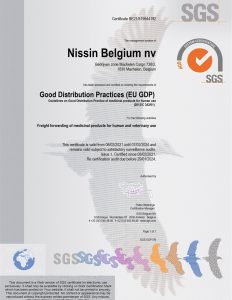When choosing the optimal transportation method for your goods, it’s important to understand the key differences between rail and road freight forwarding. Each option presents distinct advantages and challenges that can influence your logistics strategy. This comparison will help clarify their characteristics, benefits, and ideal applications.
What is Rail Freight Forwarding?
Rail freight forwarding involves transporting goods by train. This method utilizes the rail network to move cargo over long distances, making it a preferred choice for bulk shipments and long-haul transport. Additionally, rail freight is particularly effective for large quantities of goods, especially when traveling across countries or continents.
Advantages of Rail Freight Forwarding
Cost-Effectiveness for Bulk Shipments: Rail freight is often more economical than road freight when transporting large volumes of goods over long distances. Trains can carry a substantial amount of cargo, reducing the per-unit cost of shipping.
Environmental Benefits: Trains generally have a lower carbon footprint compared to trucks. For businesses focused on sustainability, rail freight offers a greener alternative to road transport.
High Capacity: Rail freight can accommodate a larger cargo volume than trucks. This makes it ideal for industries dealing with high-volume shipments, such as mining and manufacturing.
Reliability: Rail networks are less prone to traffic congestion and road closures, leading to fewer delays than road transport.
Disadvantages of Rail Freight Forwarding
Limited Flexibility: Rail freight schedules are less flexible compared to road transport. Trains run on fixed schedules and routes, which may not align with specific delivery needs.
Infrastructure Dependency: Rail transport relies on existing rail infrastructure, which might not be available in all regions, limiting accessibility.
Handling and Transfers: Goods often must be transferred between rail and road transport for final delivery, leading to additional handling and potential delays.
What is Road Freight Forwarding?
Road freight forwarding refers to transporting goods using trucks and other road vehicles. This method offers flexibility and is suitable for both short and long distances. Moreover, road freight is often used for deliveries requiring door-to-door service, providing convenience for businesses and consumers.
Advantages of Road Freight Forwarding
Flexibility and Accessibility: Road freight provides door-to-door delivery, which is essential for reaching destinations not served by rail. This flexibility makes it suitable for time-sensitive deliveries and smaller shipments.
Speed for Short Distances: Road freight can be faster than rail for shorter distances, especially when the destination is not directly accessible by rail.
Versatility: Thanks to specialized vehicles and equipment, trucks can handle various types of cargo, including perishable goods, hazardous materials, and oversized items.
Ease of Access: Road freight forwarders can easily access remote locations and areas not connected to the rail network, providing a wider reach.
Disadvantages of Road Freight Forwarding
Higher Costs for Long Distances: Road freight can be more expensive than rail for long-haul shipments due to fuel costs and vehicle maintenance.
Traffic and Weather Impacts: Road freight is subject to traffic congestion, road conditions, and weather-related disruptions, affecting delivery times and reliability.
Environmental Impact: Trucks generally produce more emissions than trains, making road freight less eco-friendly for long-distance transportation.
Making the Right Choice for Your Business
Choosing between rail and road freight depends on various factors, including shipment size, distance, urgency, and environmental considerations. Many businesses use rail and road freight to achieve the best results, customizing their logistics strategy to address unique requirements.
Nissin Belgium: Full-Service Logistics from Air to Rail
Nissin Belgium is a freight forwarder offering customized logistics solutions via air, ocean, road, and rail. We handle various industries, such as food, life sciences and healthcare, chemicals, automotive and industrial machinery. Services include warehousing, dangerous goods handling including Lithium-ion Batteries, customs management, and fiscal representation.
We also focus on sustainability and fairness by combining global logistics expertise with local support, making it a trusted partner for transport and warehousing. Additionally, you can rely on us for specialized storage, handling and transportation solutions for Lithium-ion Batteries.
Contact Nissin Belgium today to learn customized freight solutions to improve your logistics strategy and drive your business success.






